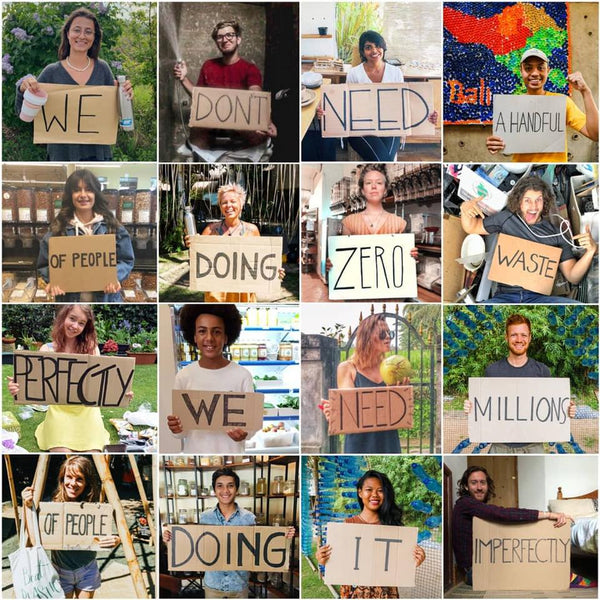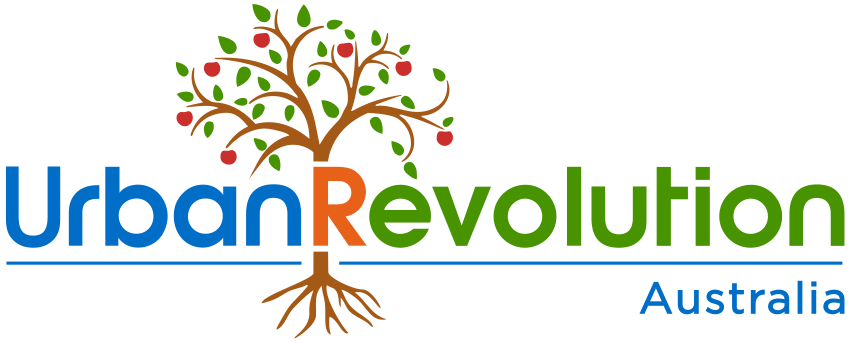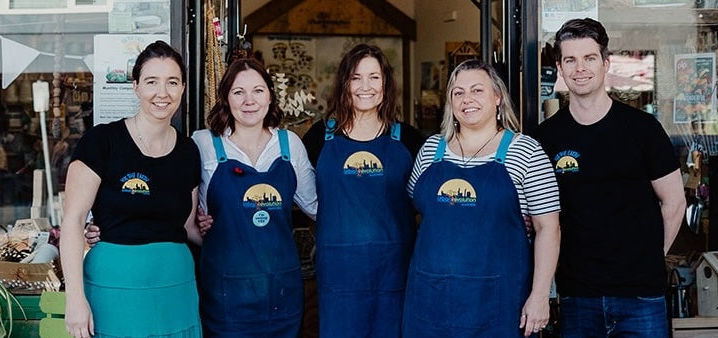Hello and welcome to all of our wonderful community who are making a further difference in the world and joining us in reducing plastic household waste! For those who are new to Plastic Free July, it is a worldwide challenge to choose to refuse single-use plastic to reduce landfill waste, reduce your eco-footprint, and protect the oceans.
Urban Revolution is passionate about helping people to live lighter, so this year we are very excited to be hosting this follow-along Plastic Free July Journey! If you haven't already, be sure to Sign Up Hereto receive updates on all the free guides, checklists, and video tutorials we will be releasing each week as we focus on reducing plastic waste in each room of the house.

Why is it important to reduce plastic waste?
Single-use plastic products and packaging are creating one of today's largest environmental problems: waste. Plastic production has increased rapidly over the years to the 300 million tons of plastic we produce each year globally now (1). These huge amounts of conventional plastics are derived from fossil fuels such as crude oil and natural gas; non-renewable resources which are very difficult to recycle (2).
Plastic is a material that is made to last forever, which means using it once and throwing it away is a big problem! Of the 8.3 billion tons of plastic ever made, three quarters of it is already waste. That is 6.3 BILLION tons of plastic waste (3), of which only 9% has ever been recycled, meaning that the vast majority of all our plastic production is accumulating in landfills or seeping into the natural environment. In 2010 alone, 8 million tons of plastic entered the ocean (1), the equivalent of five plastic bags for every foot of coastline around the globe (3), and this ocean plastic is killing millions of marine animals every year (4).
Plastic is not biodegradable, meaning that over time it instead breaks down into tiny pieces (microplastics) and releases the toxic chemical additives from the plastic in the process (5). On some beaches in Hawaii, as much as 15% of the sand is actually grains of microplastic (3). These microplastics and toxins are not only being found all over the globe but are also being found inside animals and humans, causing all kinds of health concerns.
Don't get us wrong - plastic is an amazing material that certainly has its place. The issue is that 40% of it is used just once (mostly in the form of packaging) and then discarded (4), when it is made to last forever. We need to switch our thinking! Almost all single-use plastics have sustainable alternatives that are available NOW, and making these simple, everyday swaps will drastically reduce future plastic waste that is destined to wreaking further havoc on the world. It is time to eliminate single-use plastics for the sake of human health and the Earth!
 (6)
(6)  (7)
(7)
How To Reduce Plastic Waste In The Kitchen!
Week 1 of our Journey focuses on reducing plastic waste in the Kitchen. This guide will run you through the five easiest changes you can make in your kitchen to have the largest positive impact. Give these 5 things a go this week and make a further difference in the world!
Click Here to download a printable checklist that corresponds with this week's guide. You can save this on your computer for easy access, or print the checklist and put it somewhere where it will remind you of this week's goals in reducing kitchen plastic waste!
For most households, the kitchen is the biggest culprit of single-use plastic! Fortunately, there are plastic-free alternatives to almost all single-use plastic items, it is just a matter of having the right equipment to transform your kitchen into a clean, toxic-free, and plastic-free oasis.
It is important to note that you should use your old things to the end of their lives before making the swap to eco-friendly alternatives, and remember that it's not all about being perfect straight off the bat! Every small change you make is one less sing-use plastic item ending up in landfill, which can add up to make a big difference! Good luck and have fun!
 (10)
(10)
1. Shop with the intention to avoid plastic
The majority of plastic waste comes from single-use plastic packaging, most of which can easily be avoided! This week, focus on only buying fresh produce that isn't wrapped in plastic. Choose loose oranges, bananas, apples, potatoes, spinach etc. that aren't in a pre-packaged bag. Take you're own reusable produce bag or just buy the loose fruit and veg without a bag - you don't need those plastic produce bags! If you find this difficult, try shopping at smaller independent stores that have less plastic packaging on fresh produce, or shop at your local farmers market (this will save you money too!). Of course, remember to always take your own reusable shopping bags too.
As for dry foods, bulk food stores are incredible! This week, start saving glass jars (or come and grab some from our Urban Revolution Glass Jar Exchange Box), and take them along to your nearest bulk food store. They will weigh your jars ready to be filled with everything from nuts, seeds, legumes, grains, pasta, and baking ingredients, to sweets, chocolate, teas, spices, honey, tahini, and cereals! All without a single piece of single-use plastic! If you don't have enough jars or containers, most bulk food stores have some for you to choose from in store, or you can simply use the provided paper bags. Our local bulk food stores are Loose Produce, The Source Bulk Foods, and Scoop & Pour, but there are stores scattered all over Perth (and most other cities). Check out your local bulk food store this week and see what you think!
We highly recommend investing in some reusable bulk food bags and a bread bag if these are things that would make your plastic-free shopping easier. Products like these allow you to get your fresh bread straight from a bakery without any single-use plastic packaging.
The bottom line is, try to buy as little plastic packaging as you can this week! You might be surprised how much cheaper foods are when you don't have to pay for the packaging... This is Dana from Urban Revolution doing her grocery shop at her local Farmers Market where she can get fruit, veg, and dried foods without single-use plastic.

2. Cook & store food without single-use plastic
This may seem like a simple task, but most Australian households today still use single-use cling wrap, baking paper, coffee pods, tea bags, and pre-packaged meals on a daily basis. This week, try to cook and store your meals and snacks without single-use plastic.
Cooking your own food from fresh, raw ingredients is not only better for you but also immediately eliminates single-use meal packaging! When cooking your meals, try using reusable and eco-friendly alternatives to baking paper and aluminium foil, and when it comes to storing your leftovers, use reusable containers, glass jars, and alternatives to cling wrap such as Agreena wraps and beeswax wraps. Below is a video tutorial from Dan and Dana from Urban Revolution explaining some of the cling wrap, aluminium foil, and baking paper alternatives we love.
If you are worried about the life of your fresh fruit and veg without wrapping them in plastic, The Swag is a wonderful natural and Australian-made fresh produce storage bag that significantly lengthens the life of your raw fruit and veg!
One of the most common questions we get is about how to freeze food without plastic. The answer is cheap and simple: glass jars! Save and reuse glass jars from the kitchen for freezing almost any food, from meals to home-made ice cream. Just make sure to freeze your jars of food without the lid first, and pop the lid on later to avoid pressure buildup as the contents freeze and expand. Being able to reheat your food inside the jars is also handy (without the worry of toxic chemicals leeching into your food from plastic). This is a great article about storing and freezing food without plastic if you would like to read more on this topic.
For the coffee and tea drinkers out there, there are some awesome reusable products which allow you to ditch the mainstream single-use products and save money in the long run! Reusable coffee capsules allow you to refill a single stainless steel pod with fresh ground coffee instead of having to continually buy more plastic pods, and investing in a stainless steel tea infuser, organic cotton reusable tea bag, or a bottle with an inbuilt tea infuser allows you to use loose-leaf tea instead of tea bags (which is much cheaper and avoids using tea bags that often contain plastic!).



3. Eat & drink out without single-use plastic
Roughly 52.5 million liters of oil is used to produce plastic bottles in Australia each year, and 45.7 thousand tons greenhouse gases are released during this process (not including the energy and emissions from transporting and refrigerating the bottled water). The result is over 373 million plastic bottles finding their way into landfill and the natural environment (8), and people drinking water that they could have just as easily got from their own tap (and many studies have shown that tap water is often better for you too!).
In the move towards eliminating single-use plastic, having good alternatives on hand is essential. This week of Plastic Free July, we'd love to encourage you to get into the habit of having eco-friendly alternatives on hand for when you need them. For our team at Urban Revolution, this looks like keeping a reusable coffee cup, stainless steel straw, and bamboo travel cutlery set in your backpack or handbag, taking a reusable water bottle out with you, and having a reusable container or lunch box ready to collect a takeaway lunch in if you need it.
If you are worried about the quality or taste of tap water in your reusable water bottle, you could also give a stick of Tosa Binchotan (a totally natural, plastic free, and portable water filter) a go this week!
There are alternatives to almost every single-use plastic product out there, and cafes, restaurants, and other food vendors love it when you offer your own reusable product to collect your food or drink in. For example, an insulated tumbler for smoothies, juices, milkshakes, and ice coffees could be a great purchase for those who find themselves regularly using single-use plastic drink cups.
If you are unsure where to start, a reusable coffee cup and reusable straw are two of the best swaps to start with because disposable coffee cups and straws can never be recycled!

4. Compost kitchen scraps and eliminate plastic bin liners
60% of the average Australian domestic bin is made up of organic material, including 40% food waste and 20% garden waste (9). That means you could reduce your household waste by a whopping 60% with just one change to your home! Reducing organic waste going to landfill also reduces the harmful greenhouse gasses that are released when organic material decomposes without proper composting.
One awesome home solution for organic kitchen waste is the Bokashi compost system! This small, easy, and simple compost bucket takes all organic material (including animal products which is very rare for compost systems!) and turns it into valuable outputs for you to use around the home.
Our wonderful Jo from Urban Revolution explains all about the Bokashi compost system in this short video tutorial, and shows us how using an easy solution like this eliminates the need for a plastic bin liner, and therefore eliminates one of the most common single-use plastic items in the kitchen!
5. Educate yourself on how to recycle right, and start collections for recycling!
When reducing and reusing plastic is exhausted, we turn to recycling! However, the majority of Australians are uneducated in this area and are actually causing more harm than good when they use their yellow-top recycle bin!
Every load of recycling that is contaminated with something non-recyclable (like unwashed containers, polystyrene trays, Tetra Pak milk cartons, plastic bags, and coffee cups), the whole load is thrown straight into landfill!
If you're not sure exactly what you can and can't recycle, please take some time this week to educate yourself. This 3 minute read will update you on the general Western Australia rules, and this Recycle Right resource allows you to look up any specific items you're unsure about.
Scrunchable plastics (plastic bags, bread bags, chip packets - any plastic you can scrunch up in your hand) CAN NOT be put in the yellow-top recycling bins... but they can be put into REDcycle bins found outside many local Coles and Woolies stores (all except cling wrap). We'd love to encourage you to start a REDcycle collection in your kitchen this week for your scrunchable plastics - you might be surprised how much rubbish you save! This resource will help you with your REDcycling and finding locations to take your scrunchable plastics for recycling.
While you're at it, start small collections for bottle tops and bread tags too as these also cannot be recycled in your yellow-top bins. Greenbatch is a local WA initiative to recycle plastics right here in Perth! They have public drop off days once per month where you can take your type 1 and 2 plastics, as well as bottle tops, bread tags, aluminium cans, and mobile phones to be recycled. Precious Plastics is another local plastic recycling initiative based in Vic Park who will collect your type 1, 2, 4, and 5 plastics (including bottle tops and bread tags) at the Victoria Park Farmers Market every Sunday morning.
For other hard to recycle items, TerraCycle is an amazing world-wide organisation helping to recycle all kinds of difficult products. Use their website to search for your closest drop off locations for things like beauty product containers, cleaning product bottles, oral care packaging, and used coffee pods. Our Urban Revolution store is a collection point for mail satchels and beauty product packaging if you would like to dispose of these items consciously!
It is also important to note that NO batteries or other electronics can be recycled in your yellow-top recycle bin, but almost EVERY piece of electronics CAN be recycled! Total Green Recycling is a local WA business that is passionate about saving e-waste from landfill and recycling these valuable materials. They, or the Recycle Right phone app, can help you to find your nearest battery and electronics recycle bins.
Thank you and good luck!
Thank you so much for joining us on our 2019 Plastic Free July Journey and we can't wait to see how you go!
Remember to photograph your progress throughout the journey - every person who checks in at Urban Revolution Australia on Facebook or tags our @urbanrevaus page on Instagram will go into a draw to win a $50 store voucher to buy all kinds of sustainable home and garden products!
We would love to see you in our Vic Park store in Perth if you need any eco-friendly supplies or would like to chat to our knowledgeable team. Feel free to email or message us any time if you have questions of feedback.
Thank you and good luck!
Sources
(1) https://ourworldindata.org/plastic-pollution
(4) https://www.nationalgeographic.com/magazine/2018/06/plastic-planet-waste-pollution-trash-crisis/
(5) http://www.plasticfreechallenge.org/what-is-single-use-plastic
(8) http://oceancrusaders.org/plastic-crusades/plastic-statistics/
(9) http://theconversation.com/explainer-how-much-landfill-does-australia-have-78404
(10) https://www.facebook.com/ownyourimpactWA/posts/639608423171345






Leave a comment (all fields required)